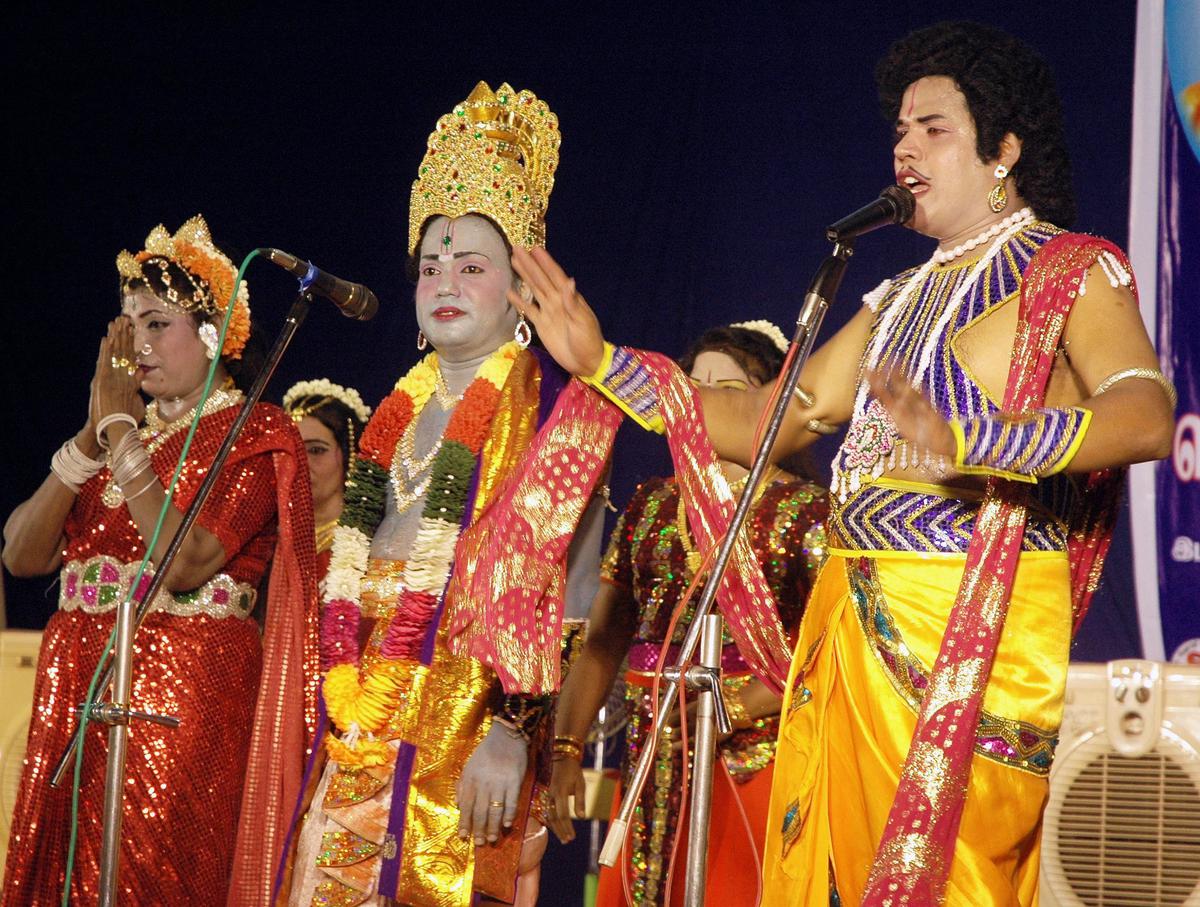Shankardas Swamigal | Photo Credit: Satish Vellinezhi
Shankardas Swamigal, Pammal K. Sambandhan Mudaliar and Paridimar Kalaignar are known as the trinity of Tamil theatre. Each brought revolutionary changes to revive Tamil theater and take it to greater heights. Shankardas Swamigal’s death anniversary was celebrated on 13 November. Born in Tuticorin in 1867, he developed a keen interest in Tamil at an early age thanks to his father, Damodaran Pillai, who was known for his proficiency in the language. He later mastered its nuances under the guidance of the scholar Palani Dandapani Swamigal.
Shankardas worked as an accountant in a salt factory for some time before entering the world of Tamil theatre. He was then associated with a drama company run by Ramudu Iyer and Kalyanaram Iyer, initially as an actor and later, as a playwright. Thus began a journey of over three decades, which would see him script nearly 50 plays. Most of his works made up the specialized drama repertoire, which refers to a form of theater where actors from different locations are ‘specially’ hired for a performance. They meet just before the show and go on stage with minimal rehearsal, as each of them is familiar with the play’s standardized dialogues and songs. Shankardas Swamigal through his Boys Company (where boys are trained in theater in the Gurukul system) Tattva Meenlochani Vidvat Bala Sabha guided many artistes. His disciples included Nawab Rajamanickam, TK Shanmugam, MR Radha, K. Sarangapani and SG Kittappa, who went on to become stalwarts of the Tamil theater world.

The play ‘Pavalakodi’ written by Shankardas Swamigal being staged at Muperum Vizha in Madurai on July 22, 2008. Photo Credit: Murthy ji
polite
in his memoirs Endhu Drama VajkkaiShanmugam writes that he and his brothers came under the tutelage of Shankardas in 1918. Shanmugam is dearest to Shankardas, who wrote ‘Abhimanyu Sundari’ keeping him in mind for the hero’s role. Remarkably, the play, lasting nearly four hours, was written entirely in one night. Shanmugam also says that Shankardas was a staunch supporter of discipline. He did not compose songs in praise of the zamindars or rich persons to get their patronage.
In 1921, Shankardas fell ill just as members of his drama company were on their way to Madras for a series of performances. However, the tour went on as per schedule. His speech and mobility were affected by the paralysis. He was taken to Madras for treatment. He still took part in the demonstrations and watched them from the wings. Although he could not speak, he was alert and through gestures often scolded actors who forgot their lines. Shankardas Swamigal spent his last days in Pondicherry, where he died on the night of 13 November.
As Shanmugam became one of the stalwarts of Tamil theatre, he never forgot the role of his mentor in his journey. In 1955, he wrote a short biography of the playwright titled, tamizh drama thalimai asiriyar, In association with colleagues such as SV Sahasranamam and TN Sivathanu, he started Sankaradas Swamigal Ninaivu Mandram and organized lectures and many events to promote theatre. In September 1967 Mandram celebrated the birth centenary of Shankardas Swamigal. A statue of the playwright was unveiled at the historic Tamukkam ground in Madurai. A memorial was also erected at the Karuvadikuppam cemetery in Pondicherry, where he was cremated. Mandram is now run by Shanmugam’s sons, TKS Kalaivanan and TKS Pugazhendi and felicitates artistes every year.
Organizations such as the Tamil Nadu Nadaga Nadigar Sangam in Madurai continue to perform ‘special plays’ across South India in memory of the legend.
his ten best
satyavan savitri
Pavalkodi Charitram
valli thirumanam
Harichandra Mayan Kandam
Kovalan Charitram
Ram Ravana Yudham
Abhimanyu Sundari
Lanka Dahanum
Lord Linga Leelai
seamanthini
The author is a heritage enthusiast and an amateur theater artist.